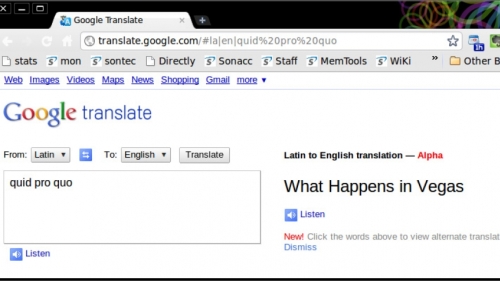Almost everyone uses language, so inevitably almost everyone thinks they are an expert in it. I don’t consider myself an expert, though most of my work requires at least language competence and sometimes actual skill, but I do follow the blogs featured on this feeds page.
(If you are wondering where the translation-related feeds have all gone, I have put them on their own page.)
Most of the blogs represented here are in English, most of the time, but don’t be surprised to find other languages used. Go with the flow – I occasionally find myself pleasantly surprised at how much I can grasp in languages I have never seen before.
Language On the Net
languagehat.com » Prok Prok Prok!
That’s the sound of applause in Indonesian, according to illustrator James Chapman in BuzzFeed, “explaining what the world sounds like in different languages.” The illustrations are a delight and I haven’t noticed any obvious errors in the multilingual onomatopoeia; there’s not much else to say except go, look, enjoy! (Also, it’s interesting, now that he points it out, that English … [Link]
Language Log » No word for father
Last week I read this article about the Mosuo people of southwest China: "The Ethnic Group in China That Doesn’t Have a Word for Father" (10/13/14). The Mosuo are indeed famous for having a matrilineal society, and I had long been aware of their unusual marriage customs, but I was innately suspicious of this sensationalist claim that there was no … [Link]
Language Log » *BEEP* vegetables
Chinglish makes an appearance in the "Translators" segment of HBO's Last Week Tonight with John Oliver (10/19): For those who may have missed my old Language Log post, this classic Chinglishism was explained at great length and with many details in "The Etiology and Elaboration of a Flagrant Mistranslation" (12/9/07), with an update and refresher in "The further elaboration of … [Link]
Language Log » In case you get bored watching the paint dry…
R.B. writes: I'm sorry that I can't provide info on where it came from originally (and for all I know, it's an oldie-but-goodie). I found it posted in a discussion group on Ravelry, which is a social networking site for knitters, spinners, weavers, and others who work with fiber.  [Link]
[Link]
Urban Word of the Day » Parallel Parkinson's
An inability to parallel park. Sufferers of this disease may try five and six times to guide their vehicle into an open space before finally giving up, and leaving the automobile 2-3 feet from the curb at an awkward angle. Her Parallel Parkinson's always seemed to flare up when she found a space in front of a restaurant with a … [Link]
the world in words » Is there such thing as an untranslatable word?
 Photo illustration by Augie Schwer/Flickr Here’s a post from Nina Porzucki. Quick — what does the French word “chouette” mean? If you flipped open the dictionary and took a look, you’d say it means a type of owl, and it literally does. But the French use it much more frequently to describe something that is cute, neat, nice or friendly — … [Link]
Photo illustration by Augie Schwer/Flickr Here’s a post from Nina Porzucki. Quick — what does the French word “chouette” mean? If you flipped open the dictionary and took a look, you’d say it means a type of owl, and it literally does. But the French use it much more frequently to describe something that is cute, neat, nice or friendly — … [Link]
the world in words » Russian curses are inventive, widely-used — and banned
 The Russian film “Da i Da” (“Yes and Yes”) directed by Valeria Gai Germanika (Screenshot: Art Pictures and VVP Alliance) Here’s a post from New York-based writer Alina Simone. The thing non-Russian speakers don’t really understand about Russian curses, or mat, is that we’re not just talking about your favorite one-syllable curse words here — mat is an entire language unto … [Link]
The Russian film “Da i Da” (“Yes and Yes”) directed by Valeria Gai Germanika (Screenshot: Art Pictures and VVP Alliance) Here’s a post from New York-based writer Alina Simone. The thing non-Russian speakers don’t really understand about Russian curses, or mat, is that we’re not just talking about your favorite one-syllable curse words here — mat is an entire language unto … [Link]
languagehat.com » The Revision (1864).
Back in 2009 I was posting enthusiastically about The Oxford History of English Lexicography , and in this post I discussed “Major American Dictionaries,” going straight from Joseph Worcester’s Dictionary of the English Language (1860) to the Century Dictionary (1889) without mentioning “The American Dictionary of 1864, the ‘Webster-Mahn’” (to quote the title of their section on it); at the time, … [Link]

0 responses so far ↓
There are no comments yet...Kick things off by filling out the form below.
You must log in to post a comment.